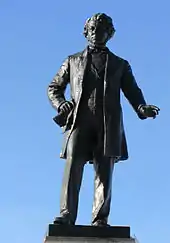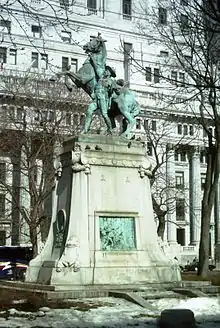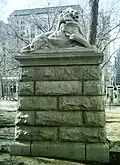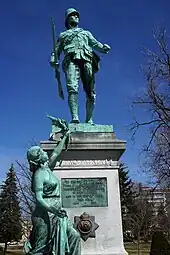George William Hill | |
|---|---|
 George William Hill (circa 1920) | |
| Born | 8 May 1861 |
| Died | 17 July 1934 Outremont (Montreal) |
| Known for | sculptor |
| Spouse | Elsie Annette Kent |
George William Hill RCA (1861 – 1934) was one of Canada's foremost sculptors during the first half of the 20th century because of his numerous public memorials.[1] He was elected in 1917 as a full member of the Royal Canadian Academy of Arts.[2][3]
Career
Hill was born in Shipton, Eastern Townships, Canada East, the son of a marble cutter. He began to carve marble in his father's workshop, and worked there for eight years becoming chief sculptor,[4] then went to Paris in 1889 to study at the École nationale des beaux-arts with Alexandre Falguière, and Jean Paul Laurens,[5] and with Henri Chapu at the Académie Julian and Jean-Antoine Injalbert at the Académie Colarossi.[3] He returned to Canada about 1894 and worked with the architects William Sutherland and Edward Maxwell.[3] By 1897, was producing monuments. In 1902 he had won his first commission, the Strathcona and South African soldiers' memorial.[3] Many commissions followed such as Sir George-Étienne Cartier (1912), marking the centenary of Cartier's birth.
Selected public exhibitions
- Société des Artistes Français, Paris (1905);[3]
- Royal Canadian Academy of Arts (1896, 1907, 1915, 1916, 1918, 1931, 1932);[6]
- Art Association of Montreal;[3]
Selected war memorials
- The Lion of Belfort, 1897;
- Boer War Memorial (1907), Montreal;
- The Monument to the Heroes of the Boer War (1912), London, Ontario;[5]
- The Sir George-Étienne Cartier Monument (1919);[5]
- The Canadian Nursing sisters' memorial in the Parliament Buildings, Ottawa, Hall of Honour, near the entrance to the Parliamentary Library (1926);[5]
- Sherbrooke War Memorial, 1926;[5]
- War Memorial, Harbord Collegiate School,286 Harbord St., Toronto, Ontario;[5]
- War Memorial, Pictou, Nova Scotia;[5]
- War Memorial, Westmount, Montreal, Quebec;[5]
- Charlottetown Veterans Memorial at Province House, Charlottetown, Prince Edward Island.[5]
Selected public collections
- National Gallery of Canada;[7]
- Montreal Museum of Fine Arts;[8]
- Musée national des beaux-arts du Québec;[9]
- Art Gallery of Hamilton;[10]
- Agnes Etherington Art Centre;[11]
- Ville de Montréal;[8]
- Ville de Sherbrooke;[12]
- City of London, Ontario;[4]
- City of Charlottetown;[4]
Works
.jpg.webp) George William Hill (sculptor)'s George Brown (1913) erected at Parliament Hill Ottawa, Ontario Canada
George William Hill (sculptor)'s George Brown (1913) erected at Parliament Hill Ottawa, Ontario Canada George William Hill (sculptor)'s D'Arcy McGee (1913) erected at Parliament Hill Ottawa, Ontario, Canada
George William Hill (sculptor)'s D'Arcy McGee (1913) erected at Parliament Hill Ottawa, Ontario, Canada George William Hill (sculptor)'s George-Étienne Cartier Monument(1919) at Mont Royal in Montreal, Quebec, Canada
George William Hill (sculptor)'s George-Étienne Cartier Monument(1919) at Mont Royal in Montreal, Quebec, Canada George William Hill (sculptor)'s George-Étienne Cartier Monument(1919) at Mont Royal in Montreal, Quebec, Canada
George William Hill (sculptor)'s George-Étienne Cartier Monument(1919) at Mont Royal in Montreal, Quebec, Canada George William Hill (sculptor)'s George-Étienne Cartier Monument(1919) at Mont Royal in Montreal, Quebec, Canada
George William Hill (sculptor)'s George-Étienne Cartier Monument(1919) at Mont Royal in Montreal, Quebec, Canada George William Hill (sculptor)'s George-Étienne Cartier Monument(1919) at Mont Royal in Montreal, Quebec, Canada
George William Hill (sculptor)'s George-Étienne Cartier Monument(1919) at Mont Royal in Montreal, Quebec, Canada George William Hill (sculptor)'s Sherbrooke War Memorial (1926) commemorating the First World War at King Street in Sherbrooke, Quebec Canada
George William Hill (sculptor)'s Sherbrooke War Memorial (1926) commemorating the First World War at King Street in Sherbrooke, Quebec Canada George William Hill (sculptor)'s Sherbrooke War Memorial(1926) commemorating the First World War at King Street in Sherbrooke, Quebec, Canada
George William Hill (sculptor)'s Sherbrooke War Memorial(1926) commemorating the First World War at King Street in Sherbrooke, Quebec, Canada George William Hill (sculptor)'s Boer War Memorial (Montreal) (1907) in Square Dorchester,
George William Hill (sculptor)'s Boer War Memorial (Montreal) (1907) in Square Dorchester,


References
- ↑ Rosalind M. Pepall. "The Architecture of Edward & W.S. Maxwell: Craftsmen and Decorative Artists". McGill John Bland Canadian Architecture Collection. Retrieved August 22, 2010.
- ↑ "Members since 1880". Royal Canadian Academy of Arts. Archived from the original on May 26, 2011. Retrieved September 11, 2013.
- 1 2 3 4 5 6 Joanne Chagnon, “HILL, GEORGE WILLIAM,” in Dictionary of Canadian Biography, vol. 16, University of Toronto/Université Laval, 2003–, accessed December 24, 2023, http://www.biographi.ca/en/bio/hill_george_william_16E.html.
- 1 2 3 "Article". canadianmilitaryhistory.ca. Canadian Military History. Retrieved December 27, 2023.
- 1 2 3 4 5 6 7 8 9 A Dictionary of Canadian Artists, volumes 1-8 by Colin S. MacDonald, and volume 9 (online only), by Anne Newlands and Judith Parker National Gallery of Canada / Musée des beaux-arts du Canada
- ↑ McMann, Evelyn (1981). Royal Canadian Academy of Arts. Toronto: University of Toronto Press. Retrieved January 3, 2024.
- ↑ "Collection". www.gallery.ca. National Gallery of Canada. Retrieved December 26, 2023.
- 1 2 "Collection". artpublicmontreal.ca. City of Montreal. Retrieved December 26, 2023.
- ↑ "Collection". collections.mnbaq.org. MNBAQ. Retrieved December 26, 2023.
- ↑ "Collection". tms.artgalleryofhamilton.com. Art Gallery of Hamilton. Retrieved January 5, 2024.
- ↑ "Collection". agnes.queensu.ca. Agnes Etherington Art Centre. Retrieved January 5, 2024.
- ↑ "Collection". dlheritage.com. Heritage Canada. Retrieved December 26, 2023.
External links
- George Hill Letter at the National Gallery of Canada, Ottawa, Ontario.
- HILL, GEORGE WILLIAM. "Dictionary of Canadian Biography, vol. 16, University of Toronto/Université Laval, 2003". biographi.ca. University of Toronto/Université Laval. Retrieved September 25, 2020.
Further reading
- Canada. National Capital Commission. Information and Historical Division (1963). Statues and Monuments in Ottawa and Hull. Ottawa: Queen's Printer. Retrieved January 5, 2024.